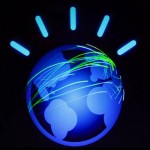The name “3D printer” doesn’t come close to evoking the transformative potential of this rapidly emerging technology. In this intriguing TED Talk, Avi Reichental describes how 3D printers are revolutionizing medicine, manufacturing, and more. How does it change our world when complexity is free?
[ted id=2026 lang=en]
Tag: medicine
 IBM’s Watson hasn’t been sitting on its circuits since it won the special Jeopardy! championship game in 2011. This Wired article describes how doctors are putting Watson to work as an expert advisor to help them diagnose cancer and save lives.
IBM’s Watson hasn’t been sitting on its circuits since it won the special Jeopardy! championship game in 2011. This Wired article describes how doctors are putting Watson to work as an expert advisor to help them diagnose cancer and save lives.
wired.co.uk/news/archive/2013-02/11/ibm-watson-medical-doctor
The smart phone in your pocket is a computer that’s much more powerful and easy to use than the mainframes of yesterday. But if this research project pans out, that phone may eventually be a replaced by a small patch on the back of your hand.
fastcodesign.com/1672217/stamp-on-circuits-could-put-your-phone-on-your-finger
We’ve been hearing about 3D printers for quite a while. But according to this Planet Money story on NPR, the 3D printer may soon be showing up all over the place, changing the way we live, shop, and work in profound ways.
npr.org/blogs/money/2013/01/04/168627298/3-d-printing-is-kind-of-a-big-deal
IBM’s Watson, the famous artificial-intelligence system that became a quiz show champ, is now poised to transform the fields of medicine, finance, education, and more. In some ways Watson is an industrial-strength version of Siri, the personal assistant built into iPhones. Is Watson leading us into a whole new era of cognitive computing? This fascinating Fast Company article puts Watson in the context of today’s data-driven world and speculates on a future that’s much bigger than talking smart phones.
fastcompany.com/3001739/ibms-watson-learning-its-way-saving-lives
The information explosion raises important questions about the free flow of information versus the threat to personal privacy. These two TED Talks present cases for more open information in government and medicine. Heather Brooke uses technology and old-fashioned hard work to expose government corruption; John Wilbanks argues that more medical information sharing is good for all of us. Whether you agree or not, you’ll likely find their stories interesting and thought provoking.
ted.com/talks/heather_brooke_my_battle_to_expose_government_corruption.html
ted.com/talks/john_wilbanks_let_s_pool_our_medical_data.html
NPR.org/2011/12/26/144146395/the-touchy-feely-future-of-technology
A few years ago touch-screen devices were novelties; today they’re everywhere. Hundreds of millions of smart phones and tablets are profoundly changing the ways people interact with tools, the Internet, and each other. This excellent NPR report covers the evolution of touch technology. Segments examine unusual uses, social implications, and future applications of this rapidly-changing technology. The site includes both text and audio versions of the story.